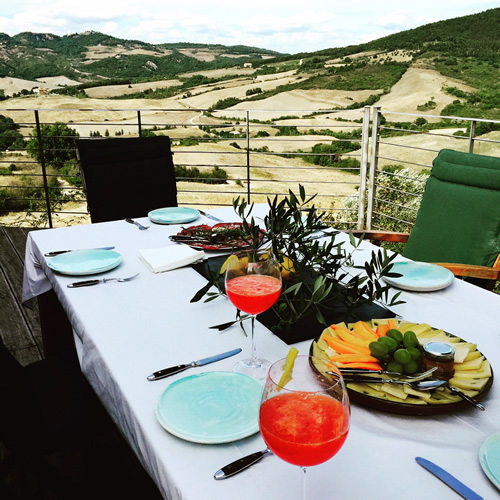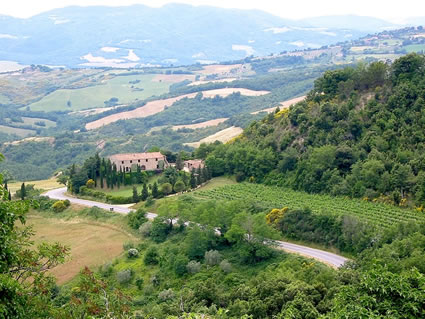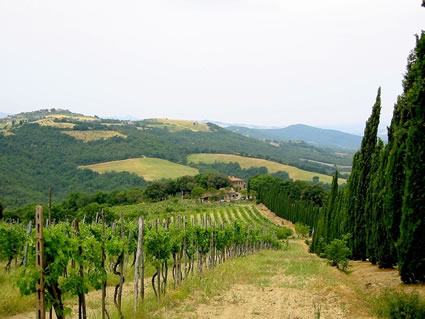Cooking Schools in Tuscany
Hands-On Lessons in La Cucina Tradizionale
By Clay and Joanna Hubbs
Updated 3/1/2024 by Transitions Abroad as seen in Transitions Abroad Magazine

|
|
A meal is soon to be served on a deck in Tuscany.
|
One year, like several other years before, my wife and I worked in the south of France. While our children attended French schools, we took frequent trips across the Italian border to Liguria and Tuscany, stopping in village trattoria to sample
for the first time "la cucina tradizionale," the regional cooking of Italian housewives.
From village to village and region to region the variety of the dishes — in the ingredients but particularly in the preparation — was astonishing. Then of course the villages were much more isolated from one another and
Italian housewives had access only to ingredients found within a small radius of their kitchens. They combined these local ingredients in special ways handed down for generations.

|
|
A Tuscan farmhouse amid grape vines and the greens of the region..
|
In Eating in Italy, Faith Heller Willinger’s authoritative guide to the gastronomic pleasures of northern Italy, the author points out that the variety in Italian cooking from one town or region to the next is due to
the combination of geography, climate, and conquest. Over centuries hordes of invaders made Italy what Willinger calls a "Mediterranean melting pot" stretching from the mountains bordering Austria and Germany in the north to the sunny
African islands of the south.
The overall extent to which traditional Italian cooking has suffered with the coming of rapid transportation and communication is a matter of debate. But thanks to the efforts of Willinger and others — most notably the "Slow
Food" association, www.slowfood.it (see our interview with the Slow Food in Italy founder), with headquarters in the northern province of
Piedmonte — who are tenaciously tracking down those who have clung to (and rediscovered) the old ways of producing and preparing food and wine, it’s now possible for even the short-time visitor not only to taste the various foods of the past but learn to prepare them.

|
|
A typical vineyard in Tuscany.
|
To locate the schools that specialize in teaching the art of traditional Tuscan cooking we consulted Willinger, a New Yorker who has lived in Florence for more than 20 years and whose cookbook, Red, White, and Greens, gets
almost daily use in our own kitchen.
From Willinger’s recommendations we chose three schools to visit: the Capezzana Wine and Culinary Center, on the estate of Count Ugo Contini Bonaccossi in the Carmignano, a wine area west of Florence; Judy Witts’ Divina Cucina
program, which she has run since 1988, and now hosts from the beautiful town of Colle Val D'Else sitting between Florence and Siena, and La Bottega del 30 Cooking School, associated with the famous restaurant of the same name, located in the heart of the Chianti east of Siena.
The three schools and the teachers are very different, but their goals are the same: to impart the ancient culinary techniques of the women cooks of Tuscany following local recipes. The cooking is done by the students themselves
in traditional Tuscan kitchens using fresh local ingredients which the students have helped to select.
Divina Cucina Cooking School
A Tuscan experience of a different nature was offered for many years in downtown Florence at Divina Cucina. Judy Witts Francini was the owner of the great cooking school when we visited, and is a transplanted American, author, blogger, generous social media presence and influencer. She is a Tuscan food fanatic and guru who is a member of Slow Food International among many other associations. Judy feels that the key to Tuscan cooking is using the very best and freshest ingredients and
doing as little as possible to alter their natural tastes. Judy has always been an ardent student and then teacher of cooking.
Judy now offers video classes, recipes, her great book "Secrets from my Tuscan Kitchen!" and excellent Tuscan Food Cooking Guides online via an app.
Tenuta di Capezzana Wine and Culinary Center
The Capezzana Wine and Culinary Center is located in an imposing Medici villa on an estate that has been famous for its wine and olives since the ninth century. Countess Lisa, known as one of the best home cooks in Tuscany,
has for the past five years used the estate’s kitchen and facilities to offer a series of programs designed especially for food professionals, skilled cooks, and those involved with food and wine.
More than a cooking school, the Center, in which all the family participates, offers an introduction to Tuscan life. After a first night at the Hotel Principe in Florence, the 5-day program begins in the traditional kitchens
of the estate with a morning cooking class, lunch, and hands-on pizza and focaccia cooking using a wood oven.
The second day is devoted to tasting and pairing wines with food under the guidance of winemaster Nicholas Belfrage. Dinner is at a local restaurant. The third day starts with a shopping trip to Florence’s Sant’ Ambrosio
market where students select for themselves what they will prepare for dinner. Lunch is at Florence’s top restaurant for traditional cooking, Cibreo. On day four students visit local artisans — bakers, butchers, chocolate makers, etc. — before
another hands-on cooking session in the Capezzana kitchen.
Day five is taken up with an exploration of the Chianti and its wines, tasting local cheeses and salamis at wineries, and buying meats, fruits, and vegetables for the farewell dinner with the Contini Bonaccossi family. The
elaborate farewell banquet is prepared by a guest chef.
In addition to the cooking school, the Center also offers weekend wine tasting courses under the guidance of a master of wine. (The Institute of Masters of Wine is an internationally recognized body of experts on wine production
and assessment.) The estate sells its own famous collection of wines and olive oil. Benedetta Contini Bonaccossi, who is in charge of sales, also can arrange stays at local farms.
A stay at Capezzana is most remarkable for the brief sense of the "Tuscan experience." Guests stay in a wing of the villa and join the warmly hospitable Bonaccossi family at meals. The lively talk is mostly of food
and wines — while you enjoy "your" food and the best wines of the region.
La Bottega del 30
Tucked away in a tiny medieval borgo dominated by a winery is one of the Chianti’s finest restaurants, La Bottega del 30. Several years ago, the charming young chef, Hélène Stoquelet, married a Tuscan,
Franco Camelia, and began to study the ways of traditional Tuscan country cooking — which she has adapted and refined to such a point that the restaurant has received a coveted Michelin star.
Note: Since receiving the Michelin star, the cooking classes we participated in as described below for La Bottega Del 30 have been discontinued, though many other schools in the area follow similar methods.
* * *
Cooking classes are held in a specially-designed kitchen apart from the restaurant. Each student has his or her own stove, work space, utensils, and ingredients. (Students keep their utensils after finishing the course.)
The emphasis each day is on a separate part of the meal: Monday, antipasti; Tuesday, soups and sauces; Wednesday, fresh pastas; Thursday, meats; Friday, dessert.
After each lesson, which lasts from 10 a.m. to approximately 2 p.m., students lunch in the dining room, eating the dishes they have prepared accompanied by appropriate wines.
The ancient culinary techniques of the women of Chianti are taught in an adjoining room which reproduces exactly a traditional kitchen, complete with a wood oven for baking, a brazier, and a huge country fireplace. In the
same building is a well-stocked library and videocassette collection, a wine cellar, and a museum of old farm implements and utensils used for preparing traditional Tuscan meals.
1-day lessons Monday through Friday include lunch and wine tasting. On Thursdays and Fridays there is the option of a 1-day lesson plus dinner at the restaurant; on Mondays and Wednesdays the 1-day
option is a cooking class, lunch, and wine tasting followed by an excursions to the castles of the Chianti and dinner at a typical restaurant.
* * *
Having participated in sessions at all three schools, we came to two conclusions. The first is that there surely is no better way to get a sense of Tuscany, one of the most beautiful areas of Italy and richest in artistic
and crafts heritage, than to immerse oneself in its culinary traditions. At the schools we attended you can almost “taste” the countryside — and meet some of the people who have maintained its traditional ways of growing and preparing
food.
The second is that this brief immersion in the Tuscan experience is likely to have lasting effects. We came home with our bags packed with the olive oil from Capezzana and aged cheese from the Central Market in Florence to
combine with fresh vegetables from our garden. (And of course with recipes for our favorite dishes.) When the supply runs out — and it all too quickly will — we’ll find a way to replace it.
Tuscan Cooking Schools
and Restaurants
Divina Cucina was formerly a fantastic cooking school based in Florence, and now is a very rich website full of content on authentic Tuscan cooking, and run by the inimitable Judy Witts Francini,
Capezzana Cooking School offers cooking courses as well as wine tours. Accommodations are in a wing of the Capezzana villa. The estate has a swimming pool, tennis courts,
and pathways for walking and jogging.
Organic Tuscany is an Italian cooking school that offers week-long "farm to table" organic cooking courses. The program includes visits to local organic farms, cooking classes using organic ingredients, olive oil and wine tastings and tours of Siena, Florence and San Gimignano. See their website for costs.
La Bottega del 30 is a Michelin star rated restaurant, once a fabulous cooking school, and well worth visiting for a great meal.
|
DR, CLAY HUBBS founded, published, and edited Transitions Abroad Publishing, Inc. for 30 years.
DR. JOANNA HUBBS is the owner and senior editor of Transitions Abroad.
They lived together in Tuscany for over 40 years.
|
